GALLUP NEWS SERVICE
PRINCETON, NJ -- As the U.S.-led war with Iraq moves into its third week, so does the media coverage of the war on every major television network, newspaper, radio station, and Internet news website. Professional media critics have weighed in with their opinions, but just what does the American public think of the news coverage of the war so far?
The latest CNN/USA Today/Gallup poll, conducted March 29-30, asked Americans just that question. The results show that Americans, in general, rate the media positively. Still, there has been a sharp decrease in the percentage of Americans who rate the media coverage as "excellent" since the start of the war.
Interestingly, those Americans who support the war with Iraq are most likely to rate the media coverage positively. At the same time, war supporters are also the most likely to have downgraded their views of news coverage since the war began, suggesting that this group is most sensitive to how the war is being portrayed.
Most of these patterns are similar to those that prevailed in the 1991 Persian Gulf War.
Public Ratings of the War Coverage Drop
The March 29-30 poll asked Americans to rate the job news organizations in this country have done in covering the war with Iraq. Overall, 38% of Americans say the news media are doing an excellent job in reporting on the war, and an additional 41% of respondent rate the news coverage as good. Only about one in five adults say the media are doing only a fair or a poor job.
These are generally positive results, but over the past week there has been significant change in the willingness of Americans to rate coverage of the war at the top end of the scale. At the start of the war, a significantly higher 52% of Americans said the news media were doing an excellent job covering the war, 14 percentage points higher than the current rating.
| Rating the Media Coverage of the War in Iraq |
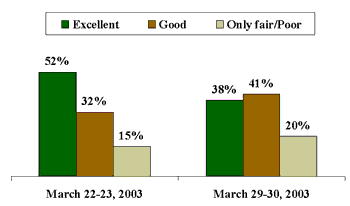 |
This drop in perceived excellence in news coverage mirrors the pattern that occurred as the first Persian Gulf War got underway in 1991. Then as now, a strong majority of Americans said the news media were doing either an excellent or good job in covering the war, but ratings of the news organizations' coverage of the war decreased several weeks into the conflict. The first poll after the start of the Persian Gulf War found 63% of Americans saying the media were doing an excellent job in their war coverage. At the end of January, that number had dropped to 42%.
| Rating the Media Coverage of the Persian Gulf War |
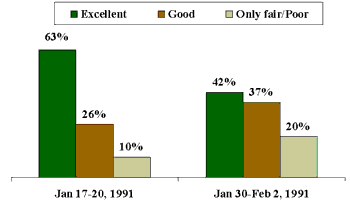 |
War Supporters More Likely to Rate the Media Favorably
Forty-one percent of people who support the war say the media are doing an excellent job reporting the war, compared with 29% of those who oppose it. But the media's positive ratings have dropped fastest among war supporters over the last week -- a decrease of 16 points. By way of comparison, among those opposed to the war, the drop in positive ratings has been only 9 points.
| Rating the Media Coverage of the War in
Iraq Percent saying media coverage is "excellent" |
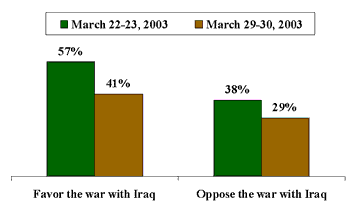 |
Again, the same pattern occurred during the first Persian Gulf War. The percentage of war supporters who said the media were doing an excellent job fell from 66% immediately after the war started to 43% a few weeks later. The percentage of those who opposed the war in 1991 and rated the media coverage of the war as excellent also decreased, but by a smaller margin, from 52% to 38%.
| Rating the Media Coverage of the Persian Gulf
War Percent saying media coverage is "excellent" |
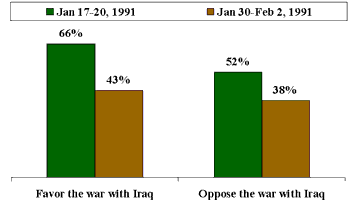 |
Coverage Makes Many Sad and Tired
Americans may be downgrading their positive perceptions of the news media's coverage of the Iraq war because the never-ending news reports make them feel sad, and also may be tiring them out.
At the start of the war, 56% of Americans interviewed as part of a Pew People and the Press poll said the coverage made them feel sad. This increased to 67% in a March 25-27 Pew poll. Likewise, only a third of Americans said the television reports tired them out when the military action first began. This has increased to 42% in the most recent Pew study.
|
Pew People & the Press Survey |
Agree |
Disagree |
No opinion |
|
% |
% |
% |
|
|
Feel sad watching TV |
|||
|
2003 Mar 25-27 |
67 |
31 |
2 |
|
2003 Mar 23-24 |
63 |
34 |
3 |
|
2003 Mar 20-22 |
56 |
41 |
3 |
|
Tires me out to watch |
|||
|
2003 Mar 25-27 |
42 |
56 |
2 |
|
2003 Mar 23-24 |
31 |
68 |
1 |
|
2003 Mar 20-22 |
33 |
64 |
3 |
News Media Getting Their Facts Straight?
Nearly six in 10 Americans believe that news organizations' war stories and reports get the "facts straight," while fewer than four in 10 say the reports are often inaccurate. As one might expect given the analysis discussed above, war supporters are more likely to say the news media get the facts straight than do non-supporters.
This assessment of the accuracy of news coverage of the Iraqi war compares favorably with other times Gallup asked about news coverage in general. A February Gallup Poll found that only 39% of Americans believe that "news organizations get the facts straight," while 58% said that the reports were often inaccurate. Since this question was first asked in 1985, the highest point for belief in media accuracy was 55%.
| Rating the Media Coverage of the War with Iraq |
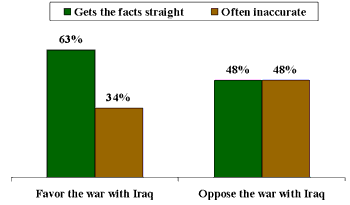 |
| March 29-30, 2003 |
Survey Methods
The results below are based on telephone interviews with a randomly selected national sample of 1,012 adults, 18 years and older, conducted March 29-30, 2003. For results based on this sample, one can say with 95 percent confidence that the maximum error attributable to sampling and other random effects is plus or minus 3 percentage points. In addition to sampling error, question wording and practical difficulties in conducting surveys can introduce error or bias into the findings of public opinion polls.
In general, how would you rate the job the news organizations in this country have done in covering the situation in the Mideast concerning the war with Iraq? Would you say it has been excellent, good, only fair or poor?
|
Excellent |
Good |
Only fair |
Poor |
No opinion |
|
|
2003 Mar 29-30 |
38% |
41 |
13 |
7 |
1 |
|
2003 Mar 22-23 |
52% |
32 |
10 |
5 |
1 |
|
Persian Gulf War |
|||||
|
1991 Jan 30-Feb 2 |
42% |
37 |
13 |
7 |
1 |
|
1991 Jan 17-20 |
63% |
26 |
8 |
2 |
1 |
Thinking about the news coverage of the war with Iraq, do you think – [ROTATED: news organizations get the facts straight, (or do you think) news organizations' stories and reports are often inaccurate]?
|
Facts straight |
Often inaccurate |
No opinion |
|
|
2003 Mar 29-30 |
59% |
38 |
3 |
Trend for Comparison:
In general, do you think -- [ROTATED: news organizations get the facts straight, (or do you think) news organizations' stories and reports are often inaccurate]?
|
Facts straight |
Often inaccurate |
No opinion |
||
|
% |
% |
% |
||
|
2003 Feb 17-19 |
39 |
58 |
3 |
|
|
2000 Dec 2-4 |
32 |
65 |
3 |
|
|
1998 Jul 13-14 ^ |
50 |
45 |
5 |
|
|
1989 Aug 9-28 ^ |
54 |
44 |
2 |
|
|
1988 Aug 24 ^ |
40 |
50 |
10 |
|
|
1988 May 13 ^ |
48 |
43 |
9 |
|
|
1988 Jan 8-17 ^ |
44 |
48 |
8 |
|
|
1985 Aug 17 ^ |
50 |
38 |
12 |
|
|
1985 Jun 22 ^ |
55 |
34 |
11 |
|
|
^ |
Items not rotated. WORDING: In general, do you think news organizations get the facts straight, or do you think that their stories and reports are often inaccurate? |
|||
